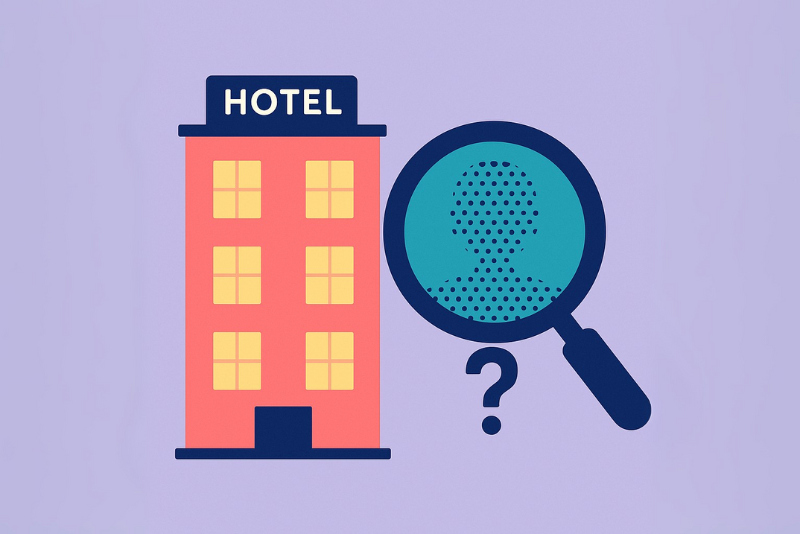The Hidden Costs of Hotel Blind Spots (and How to Eliminate Them)
You can’t fix what you can’t see — and it’s costing you more than you think.
In the hospitality industry, hotels face many unique challenges that can lead to costly blind spots.
Hotel operations are like a well-choreographed dance — invisible when done right, but a full blown fire drill that when things go wrong.
A guest checks into a premium hotel room. The AC doesn’t work. The front desk has no idea. Housekeeping missed the note. Maintenance never got the task.
We’ve all been there. Something has gone wrong and you do everything in your power to fix it, but it still keeps you up at night hoping the guest doesn’t leave a negative review that’s going to tank your online rating.
If you’re a hotel owner or GM, this probably sounds familiar.
Blind spots in your daily operations aren’t just frustrating—they’re critical. They’re silently damaging your brand, burning your revenue, and exhausting your team.
The worst part? You might not even realize it’s happening.
Ignore these blind spots, and you’ll lose revenue, frustrate guests, and burn out your team — guaranteed. It’s essential to identify and resolve these blind spots.
This article breaks down key hotel blind spots, why they’re happening, and what you can do this week to start seeing — and fixing — the problems.
The Blind Spots You Can’t Afford to Ignore
Here’s what happens in most hotels, every single day:
- Rooms aren’t ready by check-in, and no one flags it until the guest is standing at the desk.
- A maintenance issue is marked as “done” — but it wasn’t.
- A guest calls about a noise complaint. No one logs it, and the guest leaves a scathing review.
A single negative review can have a measurable and significant impact on hotel bookings
It’s crucial to address issues quickly to prevent them from escalating and negatively impacting the guest experience.
These aren’t freak events. They’re the predictable result of fractured systems and communication gaps. When the process is broken, blind spots are more likely to occur.
Operational gaps directly affect the quality of service provided to guests.
What It’s Really Costing You

Blind spots come with a real price tag for your business:
- Lost revenue: Every unready room, unresolved complaint, or missed upsell opportunity adds up. Track the number of incidents to see how quickly these losses accumulate.
- Brand damage: One missed issue can lead to a review that stays online forever — tanking your future bookings and resulting in financial damage that impacts your bottom line.
- Staff burnout: Your best employees don’t want to work in constant crisis mode.
The impact:
- A single negative review can deter up to 22% of new customers.
- If 75% of your bookings are new guests and 50% of those are influenced by online reviews. You could loose 8 – 10% of your new bookings.
Why You Can’t See What’s Really Going On

The problem isn’t that your team isn’t working. It’s that they’re operating in silos, with outdated tools, and zero cross-team visibility.
Managers are stuck guessing — coordinating via clipboard and gut feel instead of real-time info. This leads to communication breakdowns and missed opportunities.
Your current communication systems are limited, making it difficult for information to flow freely between teams. Depending on outdated systems and processes can put your hotel operations at risk.
Success relies on effective communication and timely responses.
- Your PMS doesn’t talk to maintenance.
- Your task tracking lives on radios or whiteboards.
- Your updates only happen after something’s gone wrong.
You think you have a handle on operations — but you’re only able to hear about the fires after they happen, not before.
What Smart Hotels Are Doing Differently

Take one 40-room independent hotel. They were averaging three guest complaints per day. They implemented a simple real-time task tracking system with mobile access for their team, which was specifically designed to improve efficiency. Within three months, complaints dropped by over 70% — and their ADR jumped 11%.
What changed?
- One shared dashboard for operations.
- Real-time mobile updates for housekeeping, maintenance, and front desk.
- Alerts and escalations before a guest ever has to complain.
The new system brought together team members across different departments, creating a more robust and reliable workflow.
As a result, the hotel experienced a more connected and motivated workforce, leading to improved guest satisfaction and reduced staff turnover. By creating a transparent and collaborative environment, the hotel set a new standard for operational excellence.
These types of changes show how organizations in the hospitality industry can benefit from adopting modern communication solutions.
They didn’t add headcount. They just removed the blind spots.
5 Quick Wins to Regain Visibility — This Week

You don’t need a tech overhaul to get started. You need action. Here’s what you can do right now:
1 – Walk Your Hotel Like a Guest
Check in anonymously. Use the elevator. Try room service. Look through your guest’s eyes. What feels slow, broken, or disjointed? Write it down.
👉 Next-level: Rotate this assignment weekly among your leadership team and compare notes.
2 – Ask 3 Frontline Staff: “What’s Not Working?”
Pick one housekeeper, one maintenance tech, and one front desk rep. Ask: “What’s the one thing slowing you down this week?”
👉 Next-level: Start a simple “friction log” to document and prioritize recurring issues.
3 – Scan Your Last 10 Guest Complaints
Online or internal — doesn’t matter. Categorize them: delays, cleanliness, communication, etc. What pattern shows up more than once? That’s your first fix.
👉 Next-level: Share that insight with your department heads and ask for a 24-hour fix plan.
4 – Start a Shared Visibility Log
Use a Google Sheet, Trello board, or WhatsApp group. Create one place where issues get logged — and seen.
👉 Next-level: Assign owners and deadlines. Start reviewing it in daily standups.
5 – Pick 1 Metric and Track It Daily
Choose something simple but impactful — like average room turnover time. Post it where everyone sees it. Talk about it daily.
👉 Next-level: Tie it to performance incentives or recognition. Visibility drives behavior.
You Can’t Fix What You Can’t See
Blind spots don’t just cost you money. They cost you trust — from your guests, your team, and eventually, your brand.
The good news? Visibility doesn’t require a massive budget or complex software. It starts with small, focused habits that make problems impossible to ignore — and easier to solve.
Start seeing. Start fixing. And start winning back the control (and reputation) your hotel deserves.

